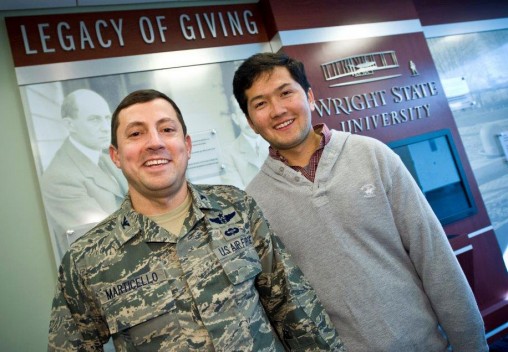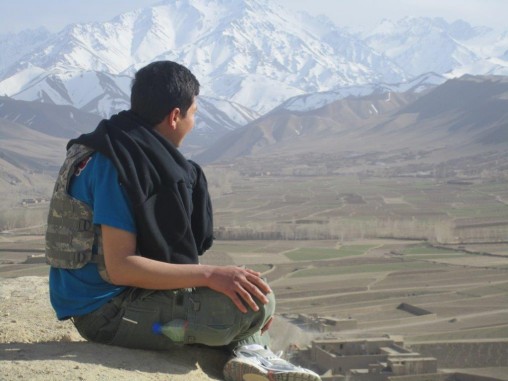
Wright State student Zia Anwari risked his life as an interpreter for U.S. military forces in Afghanistan, including for Air Force Col. Daniel Marticello, who helped him immigrate to the U.S.
To the U.S. soldiers stationed in the war zone of mountainous central Afghanistan, the 10-year-old Afghan boy who bobbed around their camp was a welcome relief from the danger-induced stress.
The boy would greet them with “What’s up?”—the first English words he learned—and be showered with cookies and candy.
As he began to learn more English, the boy would assist the soldiers by pointing out suspicious people who appeared in his nearby village. He would also go on security patrols with U.S. troops, helping them communicate with the Afghan people.
Over the next 10 years, the boy—Ziaullah Anwari—would become an invaluable interpreter for U.S. military forces at great risk to himself. He ascended to the translator stratosphere, at one point supervising 30 other Afghan linguists.
Today, the 22-year-old “Zia” is a first-year student at Wright State University. His unlikely journey delivered him from the dangers of war-torn Afghanistan, through a bog of government red tape and to a country that he served for years before ever seeing.
His safe passage came under the wing of Air Force Col. Daniel Marticello, who is back at Wright-Patterson Air Force Base after a stint in Afghanistan, where Zia served as his interpreter.
“Helping guide him through the visa process was the least I could to do after everything he had done for me,” said Marticello.
For Anwari, helping U.S. troops was a no-brainer. In a country seething with tribal tensions, his people—a race called Hazaras—have historically been oppressed and become a target of the Taliban, an Islamic fundamentalist political movement. To Anwari, U.S. soldiers were “freedom givers.”
He would accompany U.S. soldiers on overnight counterterrorist and counternarcotics operations and on security patrols through the local bazaar.
“I was very young, I didn’t feel the danger,” Anwari said. “Looking back, it was very dangerous.”
The United States has relied heavily on interpreters in Iraq and Afghanistan, most recruited from the local population. By 2010, more than 360 Iraqi and Afghan interpreters had died while working as translators for U.S. and allied forces, according to the Los Angeles Times and ProPublica.
In 2011, Anwari was offered a job at Camp Eggers, a U.S./NATO base in Kabul adjacent to the presidential palace and ministry of defense and a seven-hour drive from Anwari’s home in the province of Bamyan. He later moved to a translation job at Camp Phoenix, a large U.S. supply base in Kabul, before transferring back to Camp Eggers. It was there that he met Marticello, who had been tasked with setting up a procurement school and needed a good interpreter.
Marticello encouraged Anwari to attend college in the United States, helped him study to become qualified, paid for an exam out of his own pocket, and prodded him to get a new suit for his interview with U.S. immigration officials in Kabul.
Since passing the Afghan Allies Protection Act in 2009, Congress has allocated more than 8,700 special immigrant visas and outlined expedited procedures for granting them in cases where lives are threatened. But there have been reports of large backlogs.
Marticello said Anwari served U.S. forces in Afghanistan two or three times longer than most American soldiers deployed there.
“He gave many years of service, risking his life and arguably his family’s life,” Marticello said.
Finally, more than 18 months after he applied, Anwari was granted a special immigrant visa that makes him a permanent U.S. resident and eligible to apply for U.S. citizenship in five years. On Sept. 23, he landed at the airport in Columbus, Ohio, and was picked up by Marticello, who is letting Anwari stay with him and his family in Dayton.
Since arriving in the United States, Anwari has been soaking up American culture.
He can’t get over the parking lots with lines painted on the pavement so that people park in neat little rows. (“You Americans are so organized.”) At the invitation of his military friends, he has gone elk hunting in Colorado and to a conference at MIT in Boston, and made trips to Florida’s Gulf Coast, Georgia and Kentucky.
In October, Anwari traveled to Washington, D.C., to serve as an interpreter at a two-week conference with Pentagon officials and Afghan generals to review the budget for the Afghan military and determine how to equip the Afghan army in the coming year.
It was a bit of a trick for Anwari to get enrolled at Wright State because of his special immigration status—he didn’t have the typical student visa.
Enter the Wright State International Gateway, an international student’s primary point of contact for admissions.
Marticello said the gateway “really knocked barriers” down for Anwari.
As a result, he is currently taking business and finance courses, but wants to pursue his master’s degree in the field of international affairs.
“With his diplomatic skills, his communication skills, I could definitely see him at the World Bank or U.N.,” Marticello said.


 Wright State receives $3 million grant to strengthen civic literacy and engagement across Southwest Ohio
Wright State receives $3 million grant to strengthen civic literacy and engagement across Southwest Ohio  Fitness Center renovation brings new equipment and excitement to Wright State’s Campus Recreation
Fitness Center renovation brings new equipment and excitement to Wright State’s Campus Recreation  Wright State University settles civil lawsuit against WSARC, now doing business as Parallax Advanced Research Corporation
Wright State University settles civil lawsuit against WSARC, now doing business as Parallax Advanced Research Corporation  Wright State senior paints a new path through fine arts internship
Wright State senior paints a new path through fine arts internship  Wright State recognizes Nursing Professor Kim Ringo for advancing international student success
Wright State recognizes Nursing Professor Kim Ringo for advancing international student success 